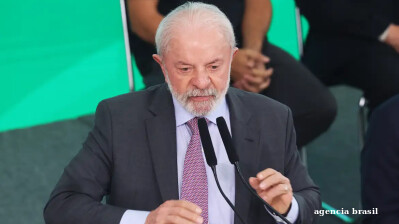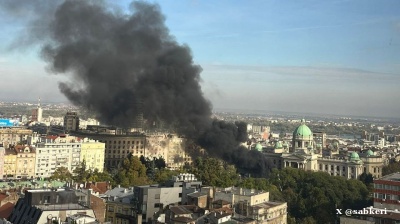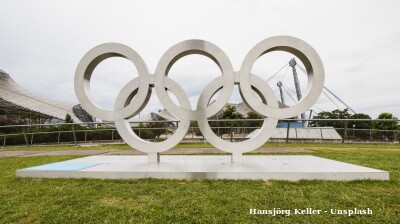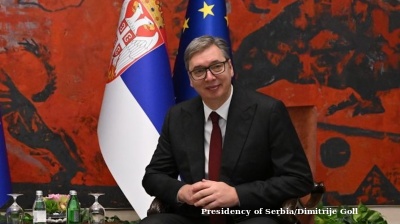A strong presence of North Macedonia’s special police units, a tense atmosphere in Skopje and incidents on the Bulgarian border marked February 4, the 151th anniversary of the birth of Macedonian national hero Goce Delcev, claimed also by Bulgaria.
The Macedonian police decided not only to maximise their presence in the capital around the church of St. Spas, where Goce Delcev is buried, but also at the eastern border crossings, after Bulgarian far right-wing MEP Angel Dzhambazki and groups of around 150 Bulgarian citizens announced that they would come to Skopje for the celebration.
In mid-January, Dzhambazki gave an insulting speech in central Skopje, saying that Macedonia is part of Bulgaria, which for Macedonians meant playing with their national feelings.
Knowing that such provocations can be an ember that might ignite a fire, and after calls on social media for Macedonians to gather massively to prevent such provocations from happening again, the Ministry of Interior in Skopje took strong security measures for the “high security risk event.”
The area around the church resembled a conflict zone, which created a tense atmosphere and a feeling that something is still wrong – why can't Macedonians celebrate a commemoration of their national hero in a relaxed manner?!
All entry points to the church were closed and guarded by special police officers in black uniforms, balaclavas and automatic weapons, except the main one at the Kale fortress, where a group of officers let a few people through, but of course, following security checks and after all the religious and government protocols in the church had finished.
Bulgarian rhetoric boosts Macedonian patriotism
Several hundreds of Macedonians were waiting at the main entrance leading to the church to pay their respects at Delcev's grave, but with heavy hearts.
“We are captured in our country. Special police guard us to celebrate the birthday of our Goce. This is a shame!,” a woman from the Rodina patriotic organisation, who was waiting to enter the church with a flag on her back, told bne IntelliNews.
However, Minister of Interior Oliver Spasovski said before the event that the police will do everything to prevent incidents and that he would not allow the humiliation of the Macedonian people and the country, especially by foreigners.
“What is happening is shameful. Goce Delcev is a Macedonian, he fought for independent Macedonia and there is no reason for Bulgarian citizens to come to Skopje to commemorate,” another female activist from Rodina said.
She blamed the Social Democrat-led government in Skopje for signing the harmful friendship agreement with Bulgaria, but also said that the opposition also bears responsibility for not doing enough to prevent this entire charade.
“All harmful agreements should be annulled – the Ohrid framework agreement with the Albanians, the Prespa agreement with the Greeks and the agreement with Bulgaria – so that we can be on our own,” she said.
There were also youngsters with balaclavas who, when asked what made them come, simply said “for Macedonia!”
Another 38-year-old Macedonian citizen travelled almost 1,000 km just for the celebration.
“I came from Austria only to be here for this event. We should attend such events en masse,” he said.
When asked what his opinion is, why Bulgarians are now so interested in attending such celebrations in Skopje, he stated: “After we signed the agreement with Greece, bowed down and changed the name to North Macedonia, Bulgaria as an EU member now want to demonstrate power, to show that it is also a factor in the region and push their agenda and achieve their goals,” he said.
Serious and worried faces of the members of Macedonian patriotic organisations were seen at the event. A large group of the opposition right-wing VMRO-DPMNE came with a big banner ‘Goce is Macedonia’ to bow at Goce's grave.
“We are enslaved in our own country,” leader of VMRO-DPMNE Hristijan Mickoski told reporters, complaining about strong police presence and overflights of helicopters during the event.
“We will see this scenario 365 days a year, at all graves of national heroes and all the monuments in the country vis-a-vis the hordes that will come from Bulgaria that want to cause destabilisation in Macedonia,” Todor Petrov, president of the World Macedonian Congress, told journalists.
Incidents on Bulgarian border
While the celebrations in Skopje passed peacefully, although tensely, an incident occurred on the border with Bulgaria, where there was a four-hour standoff due to the collapse of the computer system, which prevented a large number of Bulgarians from coming to Skopje.
North Macedonia’s Ministry of Internal Affairs announced that three Bulgarian citizens were detained at the Deve Bair border crossing for disturbing public peace and order.
"They first behaved rudely and inappropriately using the most derogatory words and then tried to physically attack the police officers while performing their duties, which was a reason to be detained,” the police said in a statement.
The celebration of the anniversary of the birth of Goce Delcev comes at a time of strained relations between Bulgaria and North Macedonia caused by a series of events during the last few weeks.
These include the beating of Macedonian citizen Hristijan Pendikov, who is a secretary of the Bulgarian cultural club Tsar Boris III, in Ohrid, the provocative statement of the Bulgarian MEP Angel Dzhamazki in Skopje that ‘Macedonia is Bulgarian’, the short withdrawal of the Bulgarian ambassador from Skopje and the Bulgarian Parliament’s controversial resolution adopted before the dissolution of the Assembly ahead of the fifth snap elections there, which condemned the alleged violence against ethnic Bulgarians in North Macedonia.
North Macedonia’s President Stevo Pendarovski said on January 23 that Russian intelligence services are behind an “anti-state campaign” in the country, which has caused its fragile relations with Bulgaria to deteriorate.
Macedonian and Bulgarian delegations paid their respect at the grave separately. While the Macedonian one was at the church in the morning, the Bulgarian delegation led by interim Interior Minister Ivan Demerdzhiev was allowed to enter at 1.30 pm. Demerdzhiev was not happy about this and wanted in future to pay respect at the grave together with his Macedonian peer Spasovski.
After laying flowers on the grave of Delcev, Demerdzhiev complained that the measures of the Macedonian police were draconian and not appropriate.
“Such security measures are not necessary. Relations between our two peoples do not imply such draconian measures as we are witnessing,” Demerdzhiev was cited by Bulgarian agency BGNES.
Demerdziev announced, apparently ironically, that they will immediately donate three power generators to the Macedonian border checkpoints so that they do not have problems like the latest "system failure", which caused hundreds of Bulgarian cars to wait for hours.
Demerdzhiev also said that he asked Bulgarian MEP Dzhamazki and Kostadin Kostadinov, head of the ultranationalist party Revival, not to come to Skopje in order for provocations to be avoided.
“Bulgarian politicians must answer the question of how relations between Bulgaria and North Macedonia can be improved. Instead of talking about artificial intelligence, exchange of technology and experience, they take us back to the Middle Ages. In order to get minor political points, Bulgarian politicians become circus performers,” Mickoski said earlier.
Political implications
The Macedonian issue is the main topic in all Bulgarian elections. While Bulgaria faces its fifth consecutive early elections in April with political parties using North Macedonia to score political points and a seat in the parliament, North Macedonia faces a crucial parliamentary vote that will determine the country’s EU future.
Unrealised goals of Bulgarians in the past centuries to make Macedonia part of the Bulgarian state came to life again by pushing the former's own agenda, particularly after the 2018 Prespa name deal with Greece, which forced Macedonia to add a prefix North to its name as a precondition for a progress in the European path, which was a painful concession for the country.
Seeing that for the sake of the EU integration, Macedonia changed its name, Bulgarian authorities started a strong campaign on all fronts to force North Macedonia to accept its demands and its version of history.
The dispute with Bulgaria, which revolves around Macedonian language, history and cultural issues, culminated with a Bulgarian veto on the launch of Skopje’s EU accession talks in December 2020.
After two years of vetos and international mediation, that veto was lifted in July 2022 with a pre-condition for the authorities to include the Bulgarian minority in the Constitution as a constitutional nation.
But since the veto, every move of the authorities and even individuals on social media are being scanned, which gives the impression that there is constant Bulgarian monitoring.
The 2021 census showed that only 0.19% of the total population in the country declared themselves to be ethnic Bulgarians, but Bulgaria claims that there are much more because hundreds of thousands Macedonians took Bulgarian passports in the past to be able to work abroad.
This fact gives Bulgaria the right to claim that there is a substantial minority which should be protected.
“Why is an Albanian with North Macedonia’s passport still an Albanian and a Macedonian with a Bulgarian passport is a Bulgarian?! I don’t understand,” a Macedonian citizen wrote in a tweet.
Nevertheless, the government agreed on Constitutional changes, but it needs a two-thirds majority in Parliament for the vote to be successful.
In an attempt to gather 80 votes in the 120-seat Assembly the government of PM Dimitar Kovacevski and ethnic Albania’s DUI is now in talks with another ethnic Albanian party to enter the government, but still will fall short of six votes, which it needs from the opposition VMRO-DPMNE for a successful vote.
The constitutional amendments should be completed by November 2023, when the EU screening process ends, and in the meantime, the authorities are trying to withstand the pressure they are exposed to, especially from Bulgaria.
Who was Delcev?
Delcev, a teacher, revolutionary, ideologist and visionary known for his quote “I understand the world solely as a field for cultural competition among peoples”, was born on February 4, 1872 in Kukus, a town in Aegean Macedonia, which is now part of Greece, and renamed Kilkis.
He was educated at the gymnasium in Thessaloniki and at the Military Academy in Sofia. He was a teacher in Macedonian town of Stip. Delcev was a leader of the Macedonian revolutionary liberation movement against the Ottoman Empire. He was killed in May 1903 in a battle with the Turkish army.
Delcev was a member of the left wing of the secret Macedonian revolutionary organisation, TMORO, which fought for an independent Macedonia, in contrast to the right wing, which was influenced by pro-Bulgarian factors and a possible merger of Macedonian territories with Bulgaria after the liberation.
The remains of Delcev were transferred from Sofia to Skopje in 1946 because of his wish to rest in the capital of the future independent Macedonia, which was at that time one of the six republics of former Yugoslavia.
“Macedonia has its own interests and its own politics. They belong to all Macedonians. The one who wants to work on the merger of Macedonia with Bulgaria, Greece or Serbia, he can be considered a good Bulgarian, Greek or Serbian, but not a good Macedonian,” is one of Delcev's most famous quotes.
News

Brazil's Lula announces fourth presidential run at 80
Brazilian President Luiz Inácio Lula da Silva has announced he will seek re-election in October 2026, confirming his candidacy during a state visit to Indonesia on October 23.

Serbian president blames opposition for “terrorist attack” outside parliament
President Vucic blamed opposition groups for what he described as a “terrorist act” outside the National Assembly in Belgrade, after a 70-year-old man opened fire on a camp of government supporters and set fire to one of their tents.

IOC sanctions Indonesia over Israel visa ban
The International Olympic Committee has announced that international sports federations will be advised not to hold competitions or meetings in Indonesia after the country barred Israeli athletes from entering.

Serbian president accuses EU of backing “colour revolution” after European Parliament adopts harsh new resolution
MEPs back the toughest rebuke yet from Brussels towards Serbia in over a decade of EU candidacy.

.jpg)


